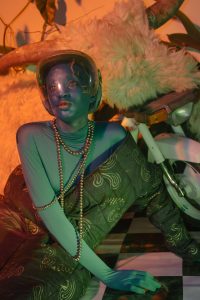Mukhtara Yusuf is a Yoruba Muslim visual artist, designer, storyteller and cultural activist from Nigeria. In my interview with her we discuss her process, ideas behind her work and the ColabNowNow residency.
Cultural activism surfaces in Mukhtara’s practice systematically, philosophically and with regards to representation. “My work comes from a place of seeing how art and design are part of popular and personal things that are often overlooked relating to political power and structural issues. As a maker it is important to talk about those things through pieces that reflect personal, vulnerable responses to happenings in the world – especially those linked to inequality.â€
With her interest in designing systems and an investment in access, Mukhtara’s designs consist of more than images and objects. Mukhtara makes use of community participation in many of her projects thereby involving the people it will serve.
The philosophical arch of her work revolves around the idea of power and questions whose knowledge is published as academic texts. “I prioritize the challenging of existing value systems and the dominance of European ways of knowing as a way to enter my making.â€
Mukhtara tells me that architecture and environment play into her textile and clothing designs as wearable surface designs or objects. Mukhtara’s architectural practice takes the form of buildings, organizational principles and systems. She attempts to understand urban ecologies that she wishes to improve with the objects she creates or by transforming them into practical systems.
Black speculative design pedagogy is term that Mukhtara developed and came about for her out of frustration by speculative design and the issues that it address. Mukhtara explains that the issues that speculative design addresses overlook the history of colonialism and creates a space in which these values become unrelenting. “Who owns the future? Who gets to dream, whose difficulties are seen as worthy of being considered in something as lofty and idealistic as speculative design. This is the ethos of my work, that I am trying to cultivate practically. By doing so it goes beyond a philosophy.â€
Speaking of a future vision she frequently creates work from speculation or imagination. “What would it be like if European knowledge wasn’t the epistemology that dominated design thinking?†Mukhtara has a desire to make it more than just fantasy.
African futurism, Afrofuturism and black speculative pedagogy are terms she chooses to use in relation to one another. She explains that these terms begin to narrow in on what she conveys in her conceptual practice. “I am considering critically what time is as a field of knowledge and how it influences people’s notions of knowing as well as ideas on social oppression.†Mukhtara sees time as a construct and feels that the linear understanding of time comes from colonialism. She continues to say that Africans were placed at the beginning of a timeline that is in need of a second stage of modernity. Her interest lies in how the conception of time is used as a means of creating disgrace and disregard towards the pain that stems from structural and private concerns.
The challenges Mukhtara is faced with in regards to creating in Nigeria has been the supreme inspiration for her cultural activism.  “It has really shown me how much influence infrastructure and class have on people’s ability to create.â€
Mukhtara’s motivation for applying to ColabNowNow came from her desire to work in collaboration with other like-minded African makers. She wishes to learn from other participants’ practices and build on her own knowledge. With a hope that the residency will create long-term collaborations, Mukhtara hopes to gain resources in order to create positive change in Nigeria. Her art tells the stories of her people.
